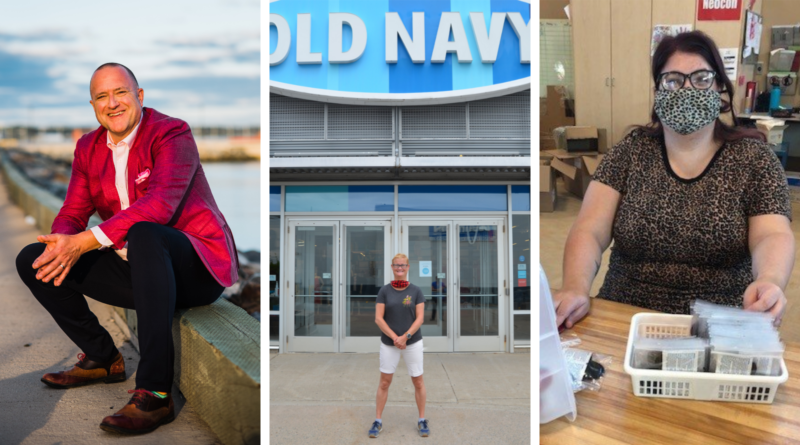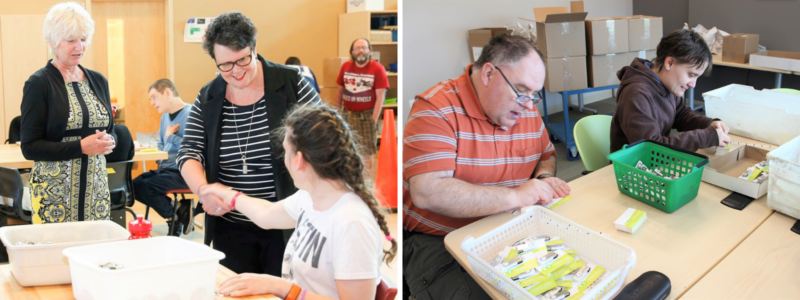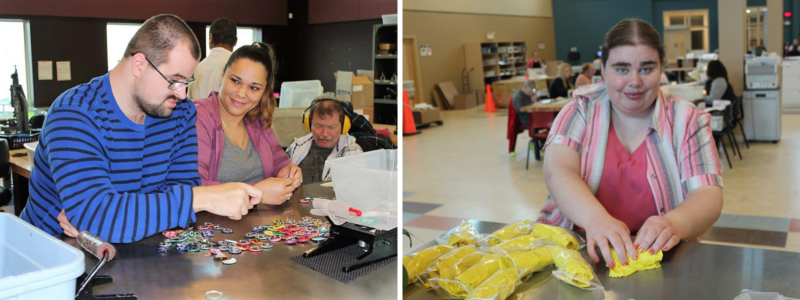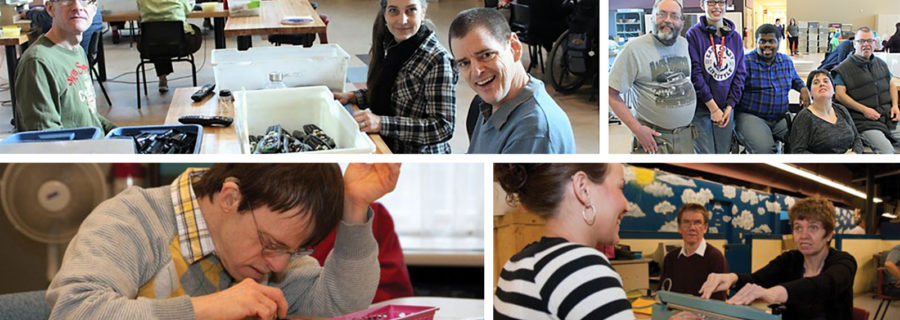For 55 years, the Dartmouth Adult Services Centre (DASC) has been serving adults with intellectual disabilities. The organization aims to provide a modern, supportive, and inclusive work environment and training center for their clients. Their facilities in Burnside include a welcoming production floor where program participants, with support staff, work on various business contracts. They produce buttons and provide packaging, mailing, and assembly services for local groups and businesses.
I recently visited DASC to speak with their Executive Director, Henk van Leeuwen, to learn more about DASC’s community, history, and programs.
Championing Diversity in the Workforce
DASC’s programs were created by an “identification of a gap in service or community need and by trying our best to match a particular business stream with the skill and ability of our participants,” says van Leeuwen. DASC has a number of longstanding contracts with loyal customers and community partners, like Maritime Paper, Eastlink, and Neocon.
I ask van Leeuwen what he would say to someone just discovering DASC. Why should they consider using their services? His answer highlights incredible benefits that go beyond the bottom line.
“Whether they're investing their ideas, time, or a potential contract with us, they're investing in inclusivity,” he says. “They're investing in the removal of barriers and they're investing in the personal and professional growth for persons with intellectual disabilities. They're investing in self-empowerment. They're investing in self-esteem. They're investing in the growth and the and the potential of every individual person here.”
DASC provides a meaningful way of incorporating diversity and inclusion into your workplace. “You're part of a of a movement to remove barriers,” says van Leeuwen. “You're part of a movement to enhance and promote accessibility. You're part of a movement to fully embrace everyone's abilities and aspirations.” Being a part of this movement directly impacts the lives of DASC’s clients.
“Many of our clients, through our programs, have found work in the community,” says van Leeuwen. “When I hear from clients who are working at an employer like Old Navy or Sobeys, they feel an enormous sense of pride and accomplishment. You're helping someone feel ownership of their own destiny, which is a very powerful thing.”
Henk shares a testimonial from Leighanne, one of their clients who recently started working at Old Navy. “I love what I do,” she says. “Coming here, to see my associates, it makes me proud. It makes me happy. It makes me feel like I’m worth it. I’m worth being here.”
Henk adds: “If you're hiring someone with a different ability, you're demonstrating to your workforce that not everyone’s abilities look or feel or sound the same. You're showing your team and the community what diversity can look and feel like.”

Navigating the Pandemic
The impact of the pandemic was particularly acute for DASC’s staff and clients. “It's challenging for all of us to navigate our way through a pandemic,” says van Leeuwen. “But if you live in a residential care facility or group home because of a different ability or a barrier, it was profoundly devastating.”
The DASC team worked diligently to combat the isolation their clients felt during periods of lockdown. “Through the pandemic, there were short bursts of time when our program participants could not come here due to COVID-19 protocols,” says van Leeuwen. “We had to transition temporarily from a business center to an outreach service. There were virtual programs, like dance and yoga online. There were zoom chats, and there was a pen pal program. Some of our staff visited our program participants and talked to them at a safe distance.”
The DASC team also rallied to fill the gaps in service contracts. In the first wave of COVID-19, DASC clients couldn’t come to the facility; but after a few months, staff were able to return and help keep orders on track. “Typically, it's our program participants who work on the contracts,” says van Leeuwen. “They're the ones making the buttons. But when our program participants couldn't come in, our staff jumped in. They went from being support professionals and program leaders to making the buttons themselves. They were doing the packaging, the mailouts.”
As he speaks, van Leeuwen’s appreciation of the DASC team is palpable. “Everyone just pitched in—they didn't even pause or hesitate for a second,” he says. “To me, that was one of the success stories coming out of the pandemic for us—that we were able to maintain our level of business contracts and that was because of our team. They're dedicated, they're professional, and they’re experts in inclusivity, empathy, and support.”

Telling DASC’s Story
The Nova Scotia government has committed to becoming a completely accessible province by 2030. “Part of that, I think, is making sure that persons with different abilities are visible,” says van Leeuwen. “That they're seen, that they're heard, that they feel that they can contribute, and that they can participate in telling their story.”
A familiar story at DASC’s annual meetings is about the waitlist. "There’s an enormous waitlist for programs like ours in the community,” says van Leeuwen. “We recently moved someone off a waitlist and into one of our programs. They had been on the wait list since 1992. This, to me, is illustrative of the challenge in our community to find programs that suit everyone's needs.”
Throughout our discussion, van Leeuwen highlights how belonging is fostered through storytelling. “I fundamentally believe that DASC belongs to our program participants,” he says. “It belongs to their families and caregivers that need a safe, supportive space for a loved one to go. And for them to feel included and have an opportunity to reach their full potential. Part of that philosophy is that it's my job to make sure that they feel empowered to tell the story of DASC, because it's theirs. We help nearly 200 people annually, and they've each got a story.”
With that, Henk invites Lindsay Crandall to join the conversation.

Meet a DASC Client: Lindsay Crandall
Lindsay steps into van Leeuwen’s office, wearing a matching leopard print top and face mask. She has dark, shoulder length hair and a handful of gorgeous tattoos — one of a rose and one of an Aquarius sign. She is both beaming and shyly smiling, holding her hands together as she catches her breath. She seems excited and a bit nervous.
Lindsay lives in Dartmouth, and she has been working at DASC for the past three years. In her spare time, she likes to visit Shubie Park to feed the chickadees by hand. The team at DASC has helped Lindsay secure a number of jobs in the community. She’s worked at Marshall’s, a bridal store (her favourite), and she’s currently volunteering at a local Senior’s Centre.
How does Lindsay feel to be at DASC? “Good — this is a place that I can go and work.” She adds that the number one thing she’s learned as DASC is “to work with other people.” She talks about a job application the DASC team recently helped her complete. She got an interview, and even though she didn’t land the job, she is ready to keep on the job search.
We talk about the impact of the pandemic on Lindsay. What was it like when DASC was closed?
“Not good,” she says. “I was really bored. It felt good to be able to come back and have something to do every day.” She adds details about the public health precautions DASC has taken since re-opening: “We have a sheet of paper that tells you which cohort you’re in,” she says. “We have different coloured buttons and different break times.”
On the DASC production floor, Lindsay is currently working on car part assembly for Neocon. Lindsay works either independently or as part of a team of 2-3 people. I ask her whether she prefers working as part of a team or on her own. She smiles slyly, raises an eyebrow at van Leeuwen, and says “independently.” She laughs at her own cheekiness. But when I ask her what the best part about working at DASC is, she says that it’s getting to work with the friends she has made on the team.
I ask Lindsay whether there is anything that she would want to tell someone who is reading her story. Her answer is immediate. “This is a really good place to work,” she says. “It's helps people who have learning disabilities find a place that they can go to work and make friends.”
As we wrap up our interview, Lindsay asks whether we will be taking her picture. She is filled with excitement at the prospect, and van Leeuwen graciously offers to take a photo of Lindsay on the production floor.
A staff member pops by to let us know that Lindsay is going to be a bit late for her next volunteer shift at the Senior’s Centre, since she took the time to speak with us this morning. But, she adds, Lindsay is still eager to have the photo taken. Van Leeuwen ducks onto the production floor to snap a shot.
When he returns, van Leeuwen gives me a tour of the boardrooms. They are gorgeous, spacious, and equipped with every technical support you could need for a meeting. Just outside of the boardrooms is a circular corkboard, dotted with buttons from past and present made by DASC clients. A client approaches us to point out the buttons he made. As we walk back to the lobby, he asks Henk for his thoughts on his “latest missive,” and Henk explains that the client is an avid storyteller, a novelist working on a story about sail boating.
I can’t help but feel sad to exit the building. The space is so bright, lively, and welcoming. As I walk back to my car, a DASC van pulls up to the building to shuttle a client to their next appointment. I think about Lindsay heading out to volunteer. Henk said that one of his priorities is to help clients tell their stories. There are so many to tell.
To donate to DASC, explore their services, or book a boardroom rental, visit dasc-ns.ca
< Back to Articles | Topics: Member Profile

